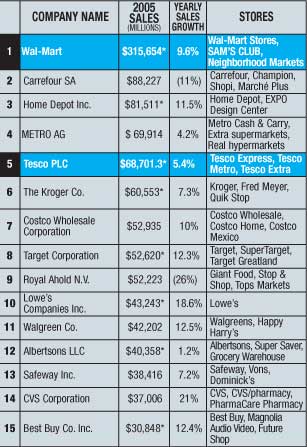Retail
| 1. WAL-MART Wal-Mart Stores Inc. recently announced that it will bring another 500 stores and clubs online with its RFID initiative by the end of this fiscal year, bringing the total number of its retail locations using the technology to more than 1,000. The RFID pioneer continues to work with its next 300 largest suppliers, which are expected to begin shipping test cases in October 2006. These suppliers will go live with their shipments in January 2007, bringing the number of supplier companies using RFID technology in concert with Wal-Mart to more than 600. "Recent internal analysis of our ongoing efforts, along with the launch of EPCglobal Generation 2 tags, reinforces the value of this technology for Wal-Mart, our suppliers and ultimately our customers," says Rollin Ford, EVP and CIO, Wal-Mart. "We're aggressively moving forward with the expansion of RFID-enabled facilities." All Wal-Mart installations moving forward would only read Gen 2 tags. As remaining pallets and cases with Gen 1 tags make their way through the distribution network, Wal-Mart will convert all of its systems to only read Gen 2 tags. 5. TESCO The United Kingdom's largest grocery retailer and the fifth largest retailer in the world, Tesco PLC, plans to enter the United States retail market with a new convenience format beginning on the West Coast in 2007. Tesco allocated almost $500 million in capital to fund the new concept, which is modeled on its innovative Express format now operating in more than 800 stores across five countries. While Tesco is concentrating solely on convenience chains in the West Coast for next year, it has a broad portfolio of store models and market opportunities to explore once the initial consumer reaction to the its brand is assessed. Should it decide to roll-out this new format nationally, Tesco may give convenience store operator 7-Eleven ' which operates 1,200 stores in California alone ' a run for its money |  |
